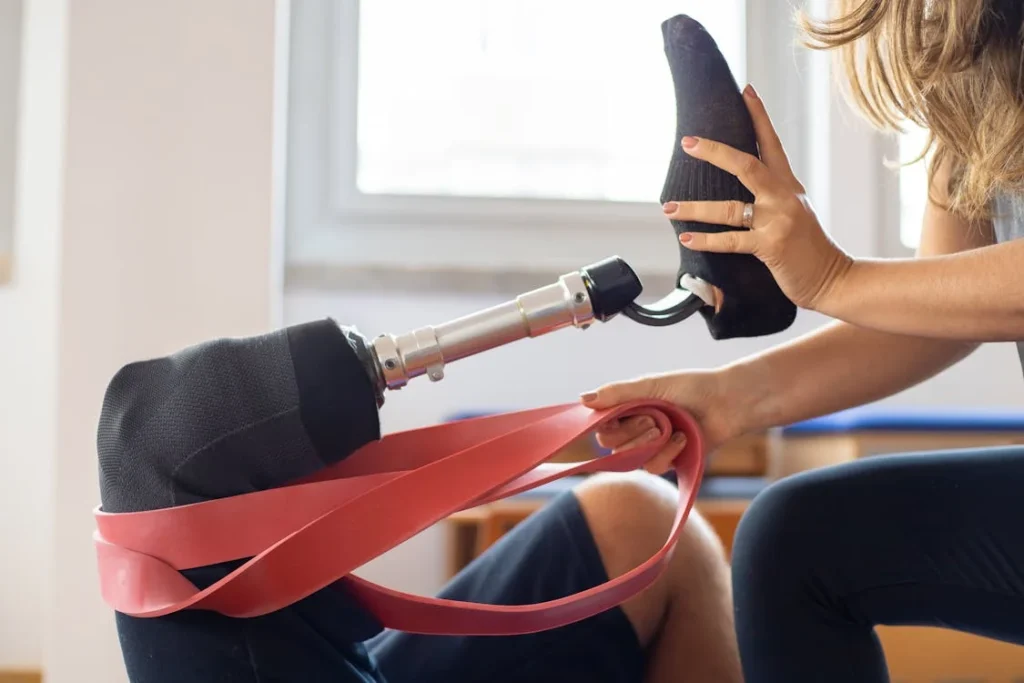Losing a limb is not just a physical change. It’s also an emotional and mental journey. For many people, the path from surgery to using a prosthetic limb can feel overwhelming. It brings up fear, sadness, and uncertainty. That’s completely normal. But what if there was something that could make this path smoother—not just for the body, but also for the mind?
This is where pre-prosthetic physical conditioning comes in. Most people think of this phase as just a way to get stronger and ready for a new limb. But it’s much more than that. When done right, this stage helps people feel more in control, more confident, and better prepared—mentally and emotionally—for what lies ahead.
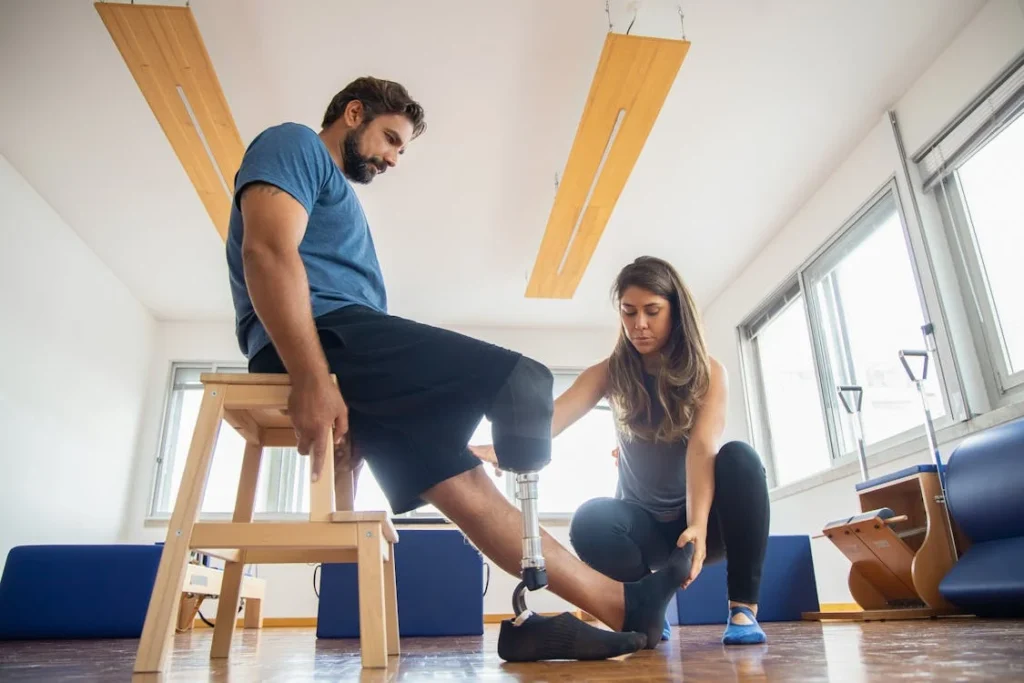
Why Pre-Prosthetic Conditioning Is More Than Just Exercise
Building Strength in the Mind Before the Body
Pre-prosthetic physical conditioning usually begins after the initial healing from amputation. During this stage, the focus is often on getting the body ready to use a prosthetic limb. That might include exercises to improve balance, build strength in the remaining limb, or improve posture.
But something else happens quietly during this process, often without being talked about enough. It begins to rebuild the person’s relationship with their body and with themselves.
After losing a limb, many people struggle to see themselves the same way. Their body feels different. Movements that were once easy may now take more effort or feel unfamiliar. These physical challenges often lead to emotional ones. Doubt, frustration, or sadness can creep in.
This is where early movement and physical preparation can help, not just by making the body stronger, but by helping a person feel like themselves again.
Simple physical routines in a familiar space, like a clinic or even at home, start to restore trust in the body. These actions, even small ones like learning to sit upright or transfer from a bed to a chair, send a quiet but powerful message to the brain: progress is possible.
Movement becomes more than a task. It becomes a form of hope. The body says, “I can still do this,” and the mind begins to believe it.
This kind of emotional feedback is deeply important. Many people who have gone through limb loss feel disconnected—not just physically but socially.
They might avoid friends, daily routines, or even mirrors. But the small wins in pre-prosthetic training slowly bring back a sense of agency. These are not just exercises. They are steps toward healing one’s self-image.
Reducing Anxiety Through Familiar Movements
A major emotional struggle for new amputees is anxiety about the future. What will walking feel like again? How long will it take to return to work? Will they be able to play with their kids or cook for their family?
These are very real questions, and they don’t always have immediate answers. But one thing is certain: the fear of the unknown can be reduced when people are gently guided to focus on what they can do now.
Pre-prosthetic conditioning gives structure to what often feels like chaos. Instead of waiting in fear for the next stage, people are given tools to begin today. Simple exercises that activate core muscles or improve upper body strength are more than workouts.
They are plans. And having a plan, even a basic one, reduces uncertainty. With uncertainty reduced, the mind relaxes. The heart rate lowers. Sleep improves. These aren’t just side effects. They are direct psychological benefits.
Each session in this phase is a message to the brain that the body is still capable. Each bit of progress, no matter how small, reinforces this belief. Over time, this confidence grows and starts to stretch beyond the therapy room.
A person who can complete a short arm lift or maintain their balance during a simple task begins to believe that they can tackle more challenging activities later. This confidence is not about being overly optimistic. It’s about being grounded in real, tangible progress.
How Movement Creates Emotional Momentum
Momentum is not just about speed. In rehabilitation, momentum is about consistency and direction. When someone sees daily or weekly improvement, they begin to believe that continued change is possible. That belief is powerful. It drives motivation.
It helps people get out of bed on days when they feel tired. It helps them stick to routines even when it’s hard. And most importantly, it helps them reconnect with their goals.
This emotional momentum is one of the most important psychological benefits of pre-prosthetic conditioning. Without it, the road ahead can feel long and discouraging.
But when people begin to notice that their body responds to effort, their emotions start to catch up. Hope is not something you wait for. It’s something you build through action. And every physical step in early rehab contributes to that.
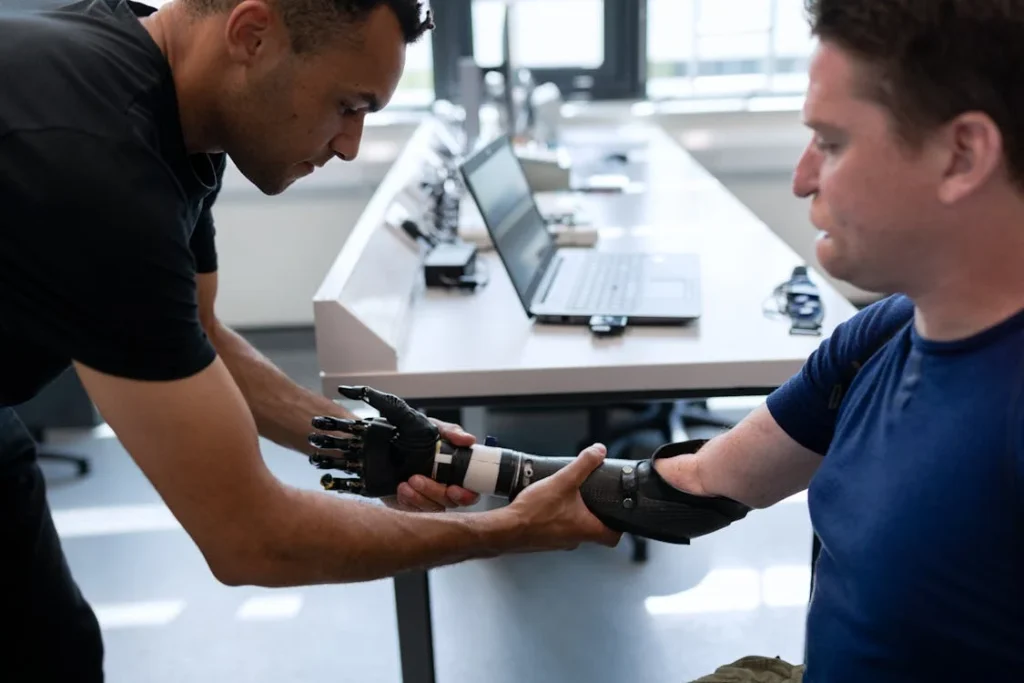
How Pre-Prosthetic Conditioning Helps Rebuild Identity
Feeling Whole Again After Limb Loss
Losing a limb doesn’t just change how you move. It often changes how you see yourself. Many people feel like they’ve lost a part of their identity, especially if their job, hobbies, or daily life involved a lot of physical activity.
They may no longer feel like the same parent, worker, or friend they once were. This sense of loss can go beyond the physical—it can touch every part of who they are.
Pre-prosthetic conditioning helps gently rebuild that sense of self. In the early stages, even before a prosthetic limb is introduced, people begin reconnecting with their body.
That connection is important because it helps a person shift focus from what was lost to what is still possible. This is not just physical recovery. It’s emotional recovery, too.
Doing small exercises, working with a therapist, and noticing gradual progress helps people reclaim ownership of their bodies. They start to trust their abilities again. They begin to see that they are still capable, still strong, and still whole—even if their body has changed. This emotional shift is subtle but powerful. It helps remove the feeling of being “broken” or “less than.” It shows the person they can still live with purpose, confidence, and dignity.
As the days pass and physical improvements show, the mental picture of the self also begins to change. It becomes clearer. It becomes more hopeful. That sense of being “me” again starts to return.
This mental clarity is one of the most important foundations for using a prosthetic limb successfully later on. A strong identity leads to better engagement in rehabilitation, better outcomes, and a better quality of life.
Emotional Safety in Familiar Movements
It’s easy to forget how comforting simple routines can be—especially when everything else feels uncertain. After surgery, the hospital bed may feel strange. The body may not behave as expected.
Pain, confusion, and sadness often visit at once. That’s why creating a space where the body can move safely, with guidance, becomes so important.
When people begin pre-prosthetic exercises, they often feel nervous. What if they fall? What if they can’t do it? These thoughts are completely normal. But with the support of a therapist or rehabilitation team, those early movements are made safe.
The room is controlled. The instructions are clear. Every small win is celebrated. This calm, predictable space becomes a source of emotional safety.
As people move through their routine—lifting their limbs, holding a position, sitting or standing with control—they start to feel more grounded. This stability goes beyond the muscles.
It enters the mind. Having a space where the body is challenged just enough, but not too much, creates confidence. It reduces fear. And over time, that sense of security follows the person outside the therapy room, too.
Confidence begins in quiet moments. It grows when someone stands up without help for the first time, or balances during an exercise that once felt impossible.
These moments, though they seem small, are victories. They are proof that progress is happening. This steady emotional grounding plays a major role in helping people stay engaged through the longer rehabilitation process that follows.
Rewriting the Story of Self
Many people who go through limb loss feel like their life story has taken a sudden turn. Things they once did without thinking—walking, dressing, cooking—now require new methods. This can create a strong sense of grief, especially if people feel like they’re no longer who they used to be.
Pre-prosthetic conditioning helps start a new chapter in that story. It becomes a chance to rewrite the narrative. The person is no longer just someone who experienced loss.
They become someone who is working, day by day, toward recovery. They are not stuck in the past—they are moving forward. This new version of the self isn’t weaker. It’s often stronger, more aware, and more resilient.
That shift in identity is not always fast. But it is real. And it is made possible through steady physical effort. As strength returns and mobility improves, so does the person’s belief in themselves.
And that belief becomes the most important tool they carry—not just through rehab, but through life.

Reducing Depression and Isolation Through Movement
The Emotional Weight of Inactivity
After limb loss, many people find themselves spending long hours alone, often stuck in bed or limited to one room. The days can feel slow, and the future uncertain. Without the ability to move freely, it’s easy to fall into a state of sadness or numbness.
Many describe feeling invisible or disconnected from the world around them. When movement stops, so does a lot of the joy that came with it—interacting with others, being outdoors, or simply walking to the kitchen to make tea. These everyday moments, which once brought comfort, suddenly disappear.
This stillness has emotional consequences. The longer someone remains inactive, the more isolated they may feel. And that isolation can quietly turn into depression.
It may begin with a lack of motivation or low energy. Over time, it can lead to a sense of hopelessness. But there is one simple, powerful way to push back: gentle, guided movement.
That’s what pre-prosthetic physical conditioning offers. It doesn’t require a gym. It doesn’t demand intense workouts. It begins slowly, often with light stretches or bed-based exercises. But those small actions start something much bigger.
They tell the brain that the body is still capable. They introduce structure to the day. They give the person a reason to wake up and engage. And most importantly, they help the person reconnect with themselves and others.
Movement as a Way to Reconnect With Others
One of the most overlooked benefits of pre-prosthetic conditioning is that it brings people back into contact with the world. Whether it’s through sessions with a therapist, conversations with caregivers, or even video calls with rehab specialists, the act of participating in guided exercise brings human connection. These moments of interaction, even brief ones, remind the person that they are not alone in this journey.
Doing exercises alongside a supportive guide—someone who offers encouragement, guidance, and patience—can lift the emotional burden many amputees carry. Laughter returns. Conversation starts again.
The focus moves away from what’s been lost and toward what can be done right now. These relationships, though professional, are filled with warmth and trust. And they help rebuild social confidence, which is often one of the first things people lose after surgery.
As the person grows stronger and more mobile, they may also find the confidence to reconnect with friends and family. Going from lying in bed to sitting at the table is not just a physical change—it’s a social one.
It allows for shared meals, more eye contact, and deeper conversations. Over time, these interactions grow, and with them, the person’s sense of belonging. This is how emotional healing truly begins: through connection, one step at a time.
Improving Mood Through Simple Progress
There is something deeply satisfying about seeing progress—even when it’s small. In pre-prosthetic conditioning, every improvement is a reminder that things are changing.
Being able to lift a leg slightly higher, hold balance for a few seconds longer, or reach a little farther brings a real sense of joy. These are not just movements. They are milestones. And each one brings a rush of emotion: pride, excitement, and relief.
That emotional reward helps regulate mood in a natural way. It releases chemicals in the brain that reduce stress and lift the spirit. For many people, this leads to better sleep, more interest in daily activities, and even a return to hobbies or interests they thought were lost.
The mind starts to shift from focusing on problems to celebrating solutions.
This is the quiet magic of physical conditioning before prosthetic fitting. It gives the body something to do—and gives the mind something to believe in. Depression loses strength when movement begins.
Isolation fades when connection is rebuilt. And hope starts to grow in the space where sadness once lived.
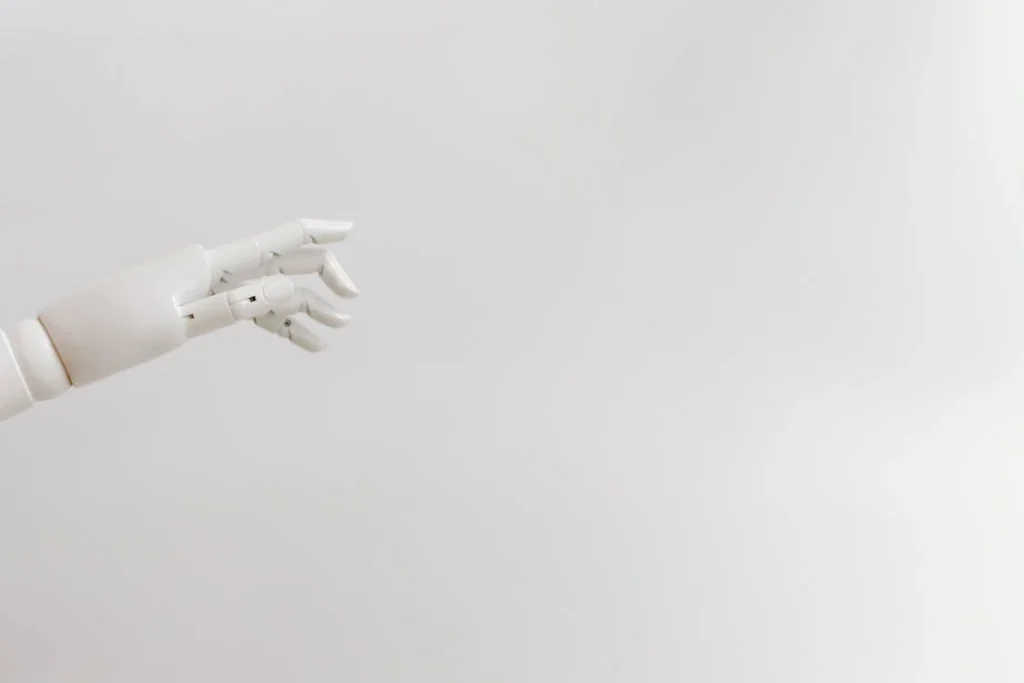
Preparing Emotionally for Life With a Prosthetic Limb
Bridging the Gap Between Healing and Hope
When someone receives a prosthetic limb, the focus is usually on how to use it—how to walk again, how to grip something, how to balance. But what many people don’t realize is that the emotional preparation starts much earlier.
Pre-prosthetic conditioning lays the groundwork for that next stage. It’s not just a warm-up for the body. It’s training for the mind, too.
Learning to live with a prosthetic is a process. It can be frustrating, especially in the early days. There’s a lot of trial and error.
But people who have already spent time moving, stretching, and strengthening their body are more emotionally ready for these challenges. They’ve already faced discomfort. They’ve already seen progress. They know that effort leads to improvement. That belief is key.
When a person has gone through pre-prosthetic conditioning, they enter the next phase with momentum. They’ve already proven to themselves that they can adapt. They’re not starting from zero.
That changes how they feel about learning to use a prosthetic. Instead of being scared, they’re more likely to feel curious or determined. This emotional state matters. It leads to better focus, more motivation, and a greater sense of control.
Lowering Emotional Frustration During Prosthetic Training
Using a prosthetic limb is not always easy in the beginning. The limb can feel unfamiliar or even uncomfortable at first. It may take a while to get the fit just right.
Movements that used to be simple—like buttoning a shirt or walking across a room—may take effort again. This can lead to frustration, especially if someone expected to feel “normal” right away.
But those who have gone through pre-prosthetic conditioning usually have a different mindset. They’ve already experienced what it’s like to struggle and improve.
They know the feeling of hard work turning into success, even if the steps are slow. So when they face these early hurdles with a new prosthetic, they’re less likely to get discouraged. They’ve built emotional endurance.
That endurance helps people stick with their training. They don’t quit when it feels awkward. They keep going because they remember how far they’ve already come.
This ability to keep going, even when it’s hard, is one of the strongest emotional tools a person can have. And it often begins during the earliest physical conditioning sessions, long before the prosthetic ever arrives.
Feeling Ready, Not Rushed
Many people feel nervous about the day they get their prosthetic. They worry about failing or falling. They fear that others will expect them to “go back to normal” too quickly.
But those who have spent time preparing their body and mind ahead of time often feel a sense of calm. They know that they’ve been working toward this moment. They don’t feel rushed. They feel ready.
That readiness makes all the difference. It allows people to approach their new limb with patience instead of panic. It helps them focus on learning, instead of just surviving. They’re able to take in instructions, ask questions, and try new things without being overwhelmed.
And emotionally, they feel stronger. They’re not just getting a new limb. They’re stepping into a new chapter—one they’ve already started writing through their own effort.
By the time the prosthetic limb arrives, much of the hard emotional work has already been done. The body has been prepared. The mind has been strengthened. The person is no longer defined by what they’ve lost—but by what they’re building, day by day.
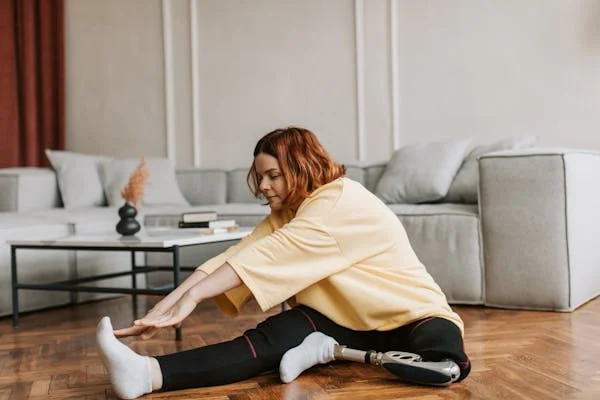
Gaining Confidence Through Repetition and Routine
Why Consistency Builds Emotional Strength
In the early stages of recovery after amputation, it’s common to feel overwhelmed. Life can feel out of control. The body has changed, and the future feels uncertain.
In moments like these, simple routines offer a kind of anchor. They bring back a feeling of normalcy, even if everything else feels new or different.
Pre-prosthetic physical conditioning often involves doing the same set of exercises each day or week. These movements may not seem exciting at first. They may even feel boring.
But this repetition serves a deeper purpose. It gives the brain something to rely on. It shows the person that no matter what else is going on, there is something they can do—and do well.
Each time a person goes through their routine, they’re not just building strength. They’re building trust in themselves. The body starts to feel more familiar again. Movements that once felt awkward begin to feel smoother. And with each improvement, confidence grows.
Confidence is not about being perfect. It’s about feeling prepared. It’s the belief that, even when things are hard, you can figure them out. Repetition builds that belief. It turns unfamiliar exercises into habits. It turns fear into focus. And over time, it turns doubt into determination.
Emotional Resilience in Small, Everyday Moments
Recovery is rarely about one big, dramatic moment. It’s about hundreds of tiny ones. Sitting up without support. Moving from a chair to a bed. Holding balance for just a few seconds longer than the day before.
These moments often go unnoticed. But they are the foundation of emotional resilience.
When a person experiences one small success after another, those moments start to stack up. They create a sense of forward motion. They remind the person that healing is happening, even if it’s slow. And that steady progress is more powerful than any single breakthrough.
Pre-prosthetic conditioning teaches people to pay attention to these moments. It helps them notice their own progress, even when it feels like nothing is changing.
This attention to small victories helps reduce negative thoughts. Instead of thinking, “I’m not getting better,” the person begins to think, “I’m stronger than I was last week.”
These shifts in thought have real emotional impact. They reduce frustration. They bring in more patience. They allow the person to focus on effort, not just outcomes. And this mindset is key when moving on to more advanced prosthetic training.
Turning Physical Effort Into Mental Breakthroughs
There is a quiet connection between the body and the mind. When the body moves with purpose, the mind often follows. Many people who begin physical conditioning report feeling mentally clearer.
They feel less foggy, less anxious. Their thoughts become more focused. This isn’t a coincidence. Movement changes brain chemistry. It lifts mood. It sharpens thinking. It gives structure to what might otherwise feel like emotional chaos.
As someone continues their conditioning, these mental benefits become even stronger. They start to carry that mental clarity into other parts of life—conversations, relationships, even problem-solving.
They begin to see themselves not as patients, but as people in progress. And that shift—from being a passive receiver of care to an active participant in healing—is one of the most powerful outcomes of all.
Routine creates rhythm. Repetition builds belief. And through that rhythm and belief, a person can rebuild their emotional strength in a way that lasts well beyond the clinic.
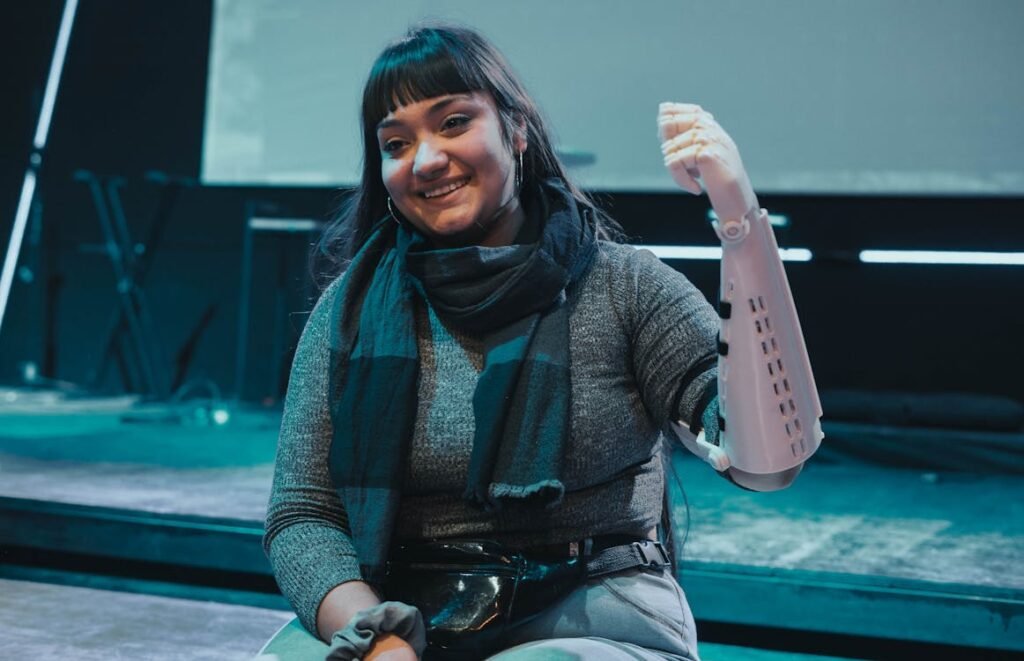
Developing a Sense of Control Over Recovery
Reclaiming Agency After Trauma
One of the hardest parts of limb loss is the feeling of losing control. The surgery, the hospital stays, the pain—all of it can make someone feel like they are just along for the ride.
This lack of control can lead to helplessness, which often becomes a source of emotional distress. It’s difficult to plan for tomorrow when you feel like you’ve lost control of today.
Pre-prosthetic physical conditioning begins to shift that. It offers structure where there was once chaos. When a person follows a daily plan—even a simple one—they are making choices again.
They are deciding to move, deciding to try, and deciding to show up. These small choices begin to rebuild the idea that recovery is not something happening to them, but something they are actively shaping.
This sense of control matters. It touches every part of a person’s mental state. It brings back confidence. It reduces anxiety. And it helps the person begin to feel powerful in their own story again.
The journey doesn’t feel like it’s in someone else’s hands anymore. It starts to feel like it belongs to them.
Using Structure to Calm the Mind
The human brain loves predictability, especially during times of stress. When life feels uncertain, structure brings comfort. Pre-prosthetic conditioning provides that structure in a way that feels personal and meaningful.
The schedule might include specific exercises, rest periods, and regular check-ins with therapists. These rhythms create a daily pattern that makes the world feel less overwhelming.
When someone follows this pattern, their mind becomes more settled. They begin to expect progress, even if it’s small. They’re not waiting for things to get better someday—they are watching it happen in real time.
This creates a feeling of stability that reaches beyond the physical. It spills into other areas of life—sleep, meals, conversations, decisions.
And with that stability, the emotional fog starts to lift. Decisions become easier. Moments of panic become fewer. The person is no longer reacting to their situation. They’re responding to it with clarity and calm. That’s the power of regaining control.
Learning That Effort Equals Progress
One of the most uplifting emotional shifts in pre-prosthetic conditioning is the realization that effort creates results. This may sound simple, but after a major medical event, many people feel like their effort doesn’t matter.
They may feel stuck or believe that nothing they do will make a difference. But conditioning changes that. Every exercise is a small experiment—and with each one, the person sees that effort pays off.
Maybe they can sit up straighter. Maybe they can stretch a little farther. These small victories are proof that the body is listening. And when the body listens, the mind follows.
Motivation grows. The desire to keep going becomes stronger. The person learns that they are not stuck. They are changing.
This shift from passivity to progress is deeply emotional. It changes the way people think about themselves. They are not broken. They are not dependent.
They are capable of shaping their own healing. That mindset is not just helpful—it’s transformative. It’s what gives someone the strength to face the harder days, and the confidence to believe in better ones.
Conclusion
Pre-prosthetic physical conditioning is often seen as just a way to prepare the body, but its true impact runs deeper. It builds confidence, restores a sense of control, and helps people emotionally reconnect with themselves and the world around them. Each stretch, lift, and breath becomes part of a larger emotional recovery—one that leads to resilience, strength, and hope.
This stage of rehabilitation is not about perfection. It’s about progress. It gives people the tools to face the future not with fear, but with readiness. The path to using a prosthetic limb starts long before the limb itself arrives—it begins with small steps, repeated with care, courage, and intention.
If you or a loved one is on this journey, know this: healing starts not just with movement, but with belief. And every bit of effort you make today builds the confidence you’ll carry tomorrow.



